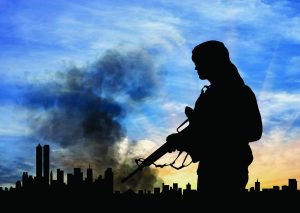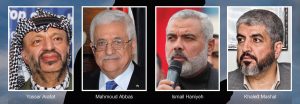×


We have detected your country as:
Please click here to go to the USA website or select another country from the dropdown list.
by: Ilse Posselt, BFP News Correspondent

Photo: Prazis/ Shutterstock
The region called the Middle East is known for many things: oceans of oil hidden beneath vast plains of burning sand, camels, the Arab Spring and calls to prayer. Yet conspicuously absent from the list of distinguishing features is a line item called “flourishing democracies.”
The reason for the omission is obvious. Apart from tiny Israel, the nearly 20 countries located in this troubled region are simply not famous for thriving political climates conducive to fairness and transparency. Instead of a succession of democratically-elected leaders dedicated to govern their citizens towards a prosperous future, history has taught the populations who call this region home to live under self-seeking monarchs, dictators and religious fanatics—to the severe detriment of the people.
The Palestinians are no exception. According to award-winning journalist, Khaled Abu Toameh, the past few decades have proven the Palestinian leadership guilty of dodging its duty of looking after its people. Abu Toameh speaks from experience. An Arab Muslim, the veteran reporter has spent more than 30 years covering—and uncovering—Palestinian affairs. Its leaders, he says, “have brought disaster to generation after generation of Palestinians.”
Palestinian politics shows an array of actors and parties functioning in a perplexing line-up of alliances, coalitions, disputes and clashes. Two major players currently dominate the landscape. The first is Fatah, a so-called secular political party headed by Mahmoud Abbas, governing in parts of Judea and Samaria. The second is Hamas, a Sunni-Islamic fundamentalist party under the leadership of Khaled Mashal, ruling in Gaza with an iron fist. Several governments, including the United States, Israel, Egypt and Jordan, view Hamas as a terrorist organization.The two parties are bitter rivals and fail to see eye-to-eye on anything from religion to relations with Israel. Whereas Fatah publicly advocates for a more moderate approach of negotiation with Israel toward a two-state solution, Hamas’s objective is the destruction of Israel. Its methods of achieving this goal include suicide bombings, kidnappings, the use of civilians and children as human shields and firing missiles at Israeli towns and cities.

Photo: Tibor Vegh/ en.wikipedia, US State department/ en.wikipedia, Sadik Gulec/ Shutterstock, Trango/ en.wikipedia
Yet grasping the current reality of Palestinian politics requires a glimpse back in time to the birth of the Palestinian Liberation Organization (PLO) and the rule of Yasser Arafat.
The PLO was called to life in 1964 for “the liberation of Palestine” through armed struggle and the destruction of Israel. Over 100 nations recognized it as the “sole legitimate representative of the Palestinian people.” Five years later, Arafat was elected chairman and since he was the founder of the Fatah political party, it became the dominant faction in the PLO.
Decades of bloodshed, war and failed peace negotiations with Israel followed. Then came the Oslo Accords in 1993. The PLO denounced “violence and terror” and recognized Israel’s right to exist. For its part, the Jewish state accepted the PLO as the official representation of the Palestinian people.
The Accords also introduced a new role-player. The Palestinian Authority (PA) was established in 1994 as an interim self-governing body to manage the Gaza Strip and parts of Judea and Samaria for five years while Israel and the Palestinians hammered out the final details of a “Framework Agreement for Permanent Status.”
The PA quickly morphed into the center of Palestinian rule and governance, employing security, police forces and civil servants and establishing its own print and audio media channels. With Arafat at the helm, the balance of power remained in the hands of Fatah and its followers.
Fatah’s rule was not unchallenged; its main opposition coming from rival party, Hamas. However, when the PA held its first presidential elections in 1996, Hamas boycotted the vote and Fatah won by a landslide.
Yet talks between Israel and the Palestinians were floundering, and when PA Chairman Arafat walked away from the negotiation table at Camp David in 2000, the Second Intifada erupted. For five years, Palestinian bloodshed haunted Israeli streets. The terror ceased after Israel was forced to erect a security barrier around parts of Judea and Samaria. Arafat died in 2004, leaving Fatah and the PA leaderless—and in the eyes of its people, untrustworthy. The stage for the face-off between Fatah and its rival, Hamas, had been set.
The 2006 parliamentary elections proved a watershed event in Palestinian politics. Hamas defeated Fatah and the successful Hamas candidate, Ismail Haniyeh, became the prime minister of the PA. In the aftermath of Fatah’s defeat, BBC quoted political analyst, Salah Abdel-Shafi, “The PA’s performance has been a story of corruption and incompetence—and Fatah has been tainted.”
Tensions between the two parties continued to simmer—and finally erupted in a violent conflict known as the Battle of Gaza. Over five days of bloodshed, Hamas combatants seized control of the Strip, murdering various Fatah officials and driving the rest from the coastal enclave. The Fatah-led PA retreated to its stronghold in parts of Judea and Samaria where it continues to govern pockets of the Palestinian population while Hamas retains its grip on Gaza.

Khaled Abu Toameh, Israeli Arab journalist
A decade later, the option between Hamas and Fatah remains to a large extent the choice between the lesser of two evils. While Hamas actively works toward Israel’s destruction, leading its people into war and violence, Fatah’s leaders are notoriously corrupt, subjecting Palestinians to a future devoid of hope and prospects. Both governments feed their people propaganda that delegitimizes the Jewish state, vilifies Israelis and denies any links between the Jews and the Promised Land. Moreover, both regimes raise their children to venerate suicide bombers and terrorists, resulting in parents who revel in their children’s bloody deaths.
When all is said and done, argues Abu Toameh, there is but one chief stumbling block that keeps the Palestinian people enslaved. “Venal leadership,” he explains, “has always been the main tragedy of the Palestinians.”
All logos and trademarks in this site are property of their respective owner. All other materials are property of Bridges for Peace. Copyright © 2024.
Website Site Design by J-Town Internet Services Ltd. - Based in Jerusalem and Serving the World.